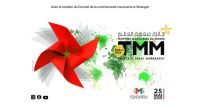French President François Hollande delivered a rare and passionate defence of the benefits of immigration as he formally inaugurated France’s first immigration museum, seven years after its hushed opening under his predecessor, Nicolas Sarkozy.
Striking a defiant tone, Hollande urged the French not to give in to scaremongers and prophets of doom, “who dream of a smaller, spiteful, retreating France – a France that is no longer France.” In a thinly veiled reference to his predecessor, who bore little love for the museum, Hollande remarked that “seven years is a long wait for an inauguration”.
Located on the edge of the Bois de Vincennes, in eastern Paris, the Museum of the History of Immigration was a pet project of former President Jacques Chirac and his Socialist prime minister, Lionel Jospin. Chirac’s successor Sarkozy made a point of not showing up for its opening in October 2007. Instead, he courted controversy by creating a Ministry of Immigration and National Identity, whose first move was to call for DNA testing of immigrants who want to bring their families to France. Most of the historians on the museum’s board promptly resigned in protest.
When Sarkozy’s Immigration Minister Eric Besson tried to stage a low-key inauguration in 2009, he was heckled by a huge crowd of angry protesters and the event had to be cancelled. The next year, the building was taken over by hundreds of undocumented immigrants, who camped there for months demanding work papers, until they were forcibly removed by the police.
Not a 'founding myth'
The museum’s troubled history reflects the sensitive nature of its subject matter in a country deeply marked by its colonial past, a rigid idea of integration, and mounting resentment of immigrants in some quarters. For historian Benjamin Stora, the museum’s new head, “the fact that a president of the Republic has the courage to stress the importance of immigration in France is in itself an event”.
Historians say up to a quarter of the French population has an immigrant background, and yet few politicians dare celebrate the contribution of migration the way their American counterparts do. Evelyne Ribert, a specialist of immigration at the National Centre for Scientific Research (CNRS), says this is no surprise. “The US has long regarded itself as a nation of immigrants, but the same cannot be said of France – despite migrants’ significant contribution to the country,” she said. “Immigration is simply not a founding myth of the Republic.”
Critics of immigration, such as the far-right National Front party, have no such qualms about addressing the issue. Marine Le Pen’s party, whose main policy proposal is to cut the annual migrant intake from the current 200,000 to 10,000, came first in European elections earlier this year, picking up a quarter of the vote.
Many of its supporters have embraced the theory of a “great replacement” of France’s population, according to which people of French stock are steadily being supplanted by non-European – read non-white, non-Christian – foreigners. While the theory has been rubbished by France’s national institute of statistics (Insee), it is gaining traction on social media and in bookshops, carried by a group of writers and thinkers obsessed with the supposed demise of French civilisation.
Among them is journalist Eric Zemmour, whose latest book, The French Suicide, has sold more than 400,000 copies. Zemmour says the French nation is being diluted by immigration and the spread of Islam, which the French state is powerless to stem. France’s Spanish-born prime minister, Manuel Valls, has described his ideas as “rancid”.
Defending Schengen
The likes of Zemmour routinely vent their anger at the European Union for embracing globalization, depriving nation states of their sovereignty, and removing barriers to the flow of migrants. Such criticism of the EU is shared by many from the political mainstream.
Sarkozy, who announced his long-expected political comeback this summer, has called for an overhaul of the Schengen accords, which allow for the free movement of people between member states. On Monday, Hollande countered by calling for a defence of Schengen, which he described as a “fundamental benefit” of European integration.
His almost hour-long speech provided plenty more opportunities for the unpopular president to distance himself from his predecessor, not least on the issue of France’s colonial past. Sarkozy has repeatedly said that France should be proud of its past and stop the “nonsense” about repentance. Since taking over the presidency in 2012, Hollande has struck a markedly different tone.
During a visit to Algeria that year, Hollande received praise for acknowledging the “brutal and unjust” manner in which France treated its former colony — a sober recognition that stopped short of the full apology officials in Algiers have long demanded. “Over 132 years, Algeria was subjected to a profoundly unjust and brutal system,” Hollande told Algerian lawmakers, to thunderous applause. “This system has a name: it is colonialism, and I recognise the suffering that colonialism inflicted on the Algerian people.”
Colonial heritage
Curiously, the building that houses the Museum of the History of Immigration was once part of the International Colonial Exposition of 1931. Its façade is covered by a huge Art Deco frieze showing colonial workers labouring for the empire. Part of the museum’s task is to reconcile France’s multicultural present with this dubious past.
The stories of migrants from France’s former colonies account for a large part of the material on show at the museum. Hailing their decisive contribution to France’s military effort during two world wars, Hollande spoke of their “right” to join France.
The French president emphasized the museum’s educational role, pledging to double the budget of an institution long under funded. Schoolchildren make up the majority of its 100,000 annual visitors, while some 2,000 teachers are trained there each year. "If compared with the Louvre or the Musée d'Orsay, then obviously visitor numbers are not flattering," said a former museum manager. "But when compared with other historical museums, it is actually doing quite well."
Its vast halls explores two centuries of immigration to France, featuring exhibits on wartime xenophobia, tales of migrant’s often perilous journeys to their new country, and tributes to famous individuals including Polish-born scientist Marie Curie, French-Algerian footballer Zinedine Zidane, and France’s last World War I veteran, the late Lazare Ponticelli, whose name testifies to his Italian origins.
Hollande described the museum as "our nation's homage to the millions who came to France to give her their best". Warning against racism, anti-Semitism and the "intolerable" rise in Islamophobia, he said the museum would help "remind the French where they come from, what values they carry as French citizens, and what direction we wish to take together”.
France24









